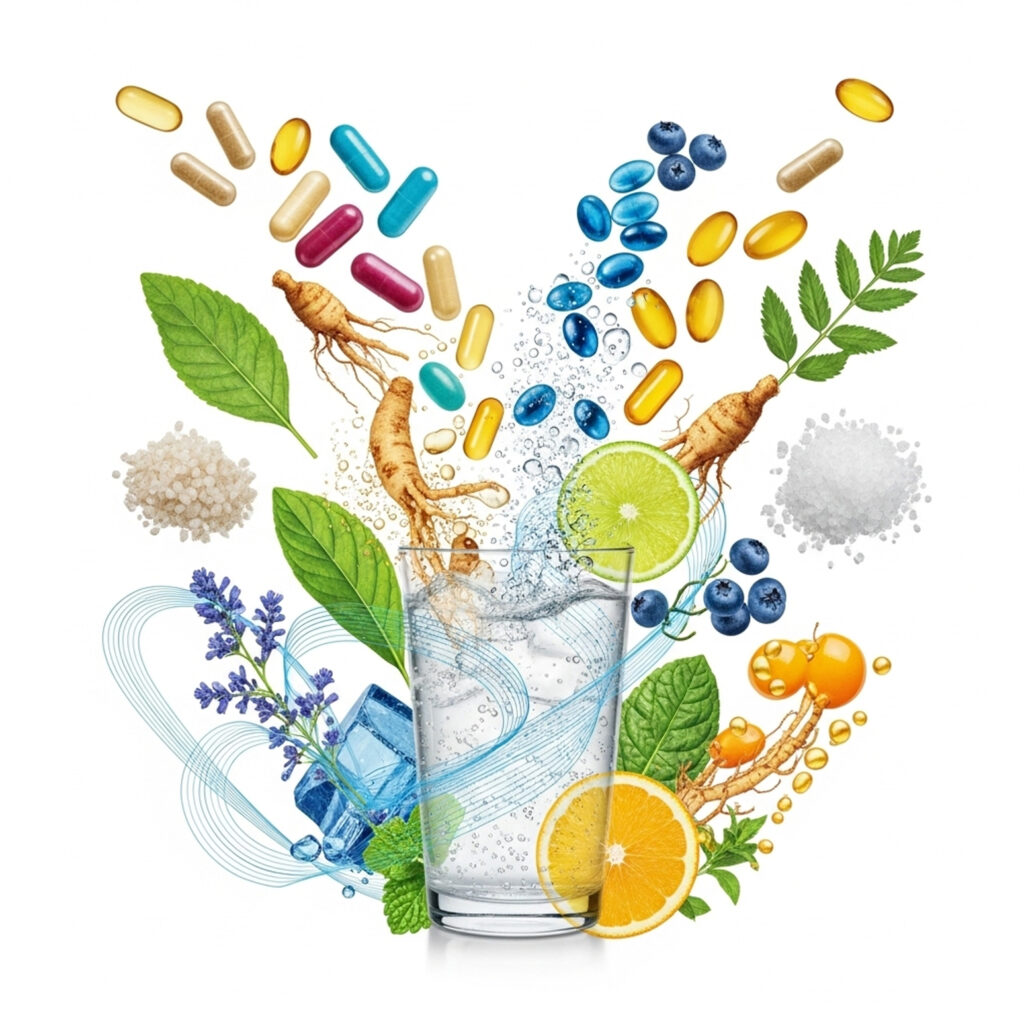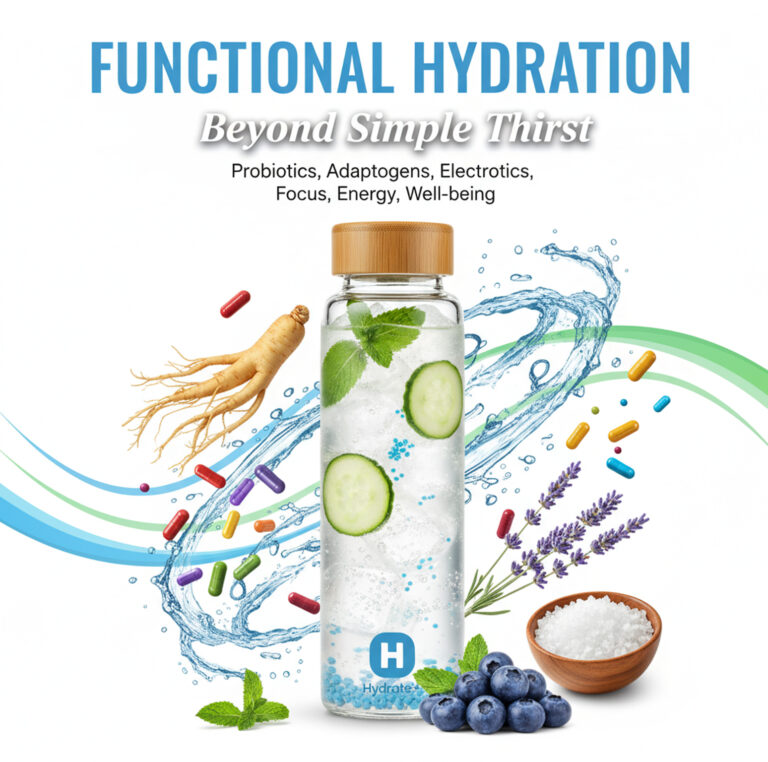Premium Biz Post – In today’s fast-paced lifestyle, consumers are increasingly searching for more than just hydration; they want beverages that deliver added health benefits. This demand has fueled the rise of functional hydration: the future drink beyond simple thirst. From boosting energy and supporting digestion to enhancing focus and mood, functional hydration has become one of the most influential trends shaping the global food and beverage industry.

The Evolution of Beverages
For centuries, beverages primarily served two purposes: to quench thirst and provide enjoyment. Water, tea, coffee, and juice were staples, while sports drinks emerged in the late 20th century to replace electrolytes for athletes. However, the modern consumer landscape has shifted. Wellness is no longer an afterthought but a lifestyle priority. As a result, beverages have evolved into platforms for functional ingredients that promise measurable benefits.
The transition from traditional drinks to functional hydration is not merely a fad. It reflects larger societal changes, including increasing health awareness, the rise of fitness culture, and growing concerns about mental well-being. People now expect their drinks to deliver a holistic experience—hydration, nutrition, and cognitive support—all in one convenient package.
What Defines Functional Hydration?
Functional hydration refers to beverages designed with added ingredients that provide specific physiological or cognitive benefits beyond basic fluid intake. These ingredients are carefully chosen to target health goals such as:
- Electrolyte balance – sodium, potassium, and magnesium to restore hydration after exercise.
- Gut health – probiotics and prebiotics to support digestion and immunity.
- Cognitive function – nootropics and adaptogens to enhance mental clarity, focus, and stress management.
- Energy support – natural caffeine, B vitamins, and plant-based compounds for sustainable vitality.
- Mood enhancement – botanicals like ashwagandha or L-theanine to promote relaxation and emotional balance.
By combining hydration with wellness science, these drinks blur the lines between nutrition, supplementation, and refreshment.
Market Growth and Consumer Demand
According to recent industry reports, the global functional beverage market is projected to surpass $200 billion by 2030, with functional hydration representing a significant share. Consumers in North America, Europe, and Asia-Pacific are driving this demand, with millennials and Gen Z leading the way. These younger generations are not only more health-conscious but also more experimental with flavors, textures, and formats.
The COVID-19 pandemic accelerated the shift. With immune health and mental resilience at the forefront, people turned to functional products for reassurance. Post-pandemic, the momentum has only grown, as wellness remains deeply embedded in consumer decision-making.
Interestingly, functional hydration is no longer restricted to athletes or gym-goers. Office workers, students, travelers, and even casual social drinkers are seeking beverages that do more than refresh—they want drinks that work for their lifestyles.
Key Ingredients Driving the Trend
The appeal of functional hydration lies in its diversity of ingredients. Here are some of the most prominent:
- Electrolytes: Essential for hydration and recovery, especially after physical activity or heat exposure.
- Probiotics & Prebiotics: Support gut health, which is linked to immunity, energy, and even mood regulation.
- Nootropics: Natural brain-boosting compounds like ginseng, bacopa, or L-theanine that enhance focus and reduce stress.
- Adaptogens: Herbs like ashwagandha, rhodiola, and holy basil that help the body adapt to stress.
- Plant-Based Energy Sources: Green tea extract, yerba mate, or guayusa provide smoother energy compared to synthetic caffeine.
- Collagen & Protein: Support skin health, joint strength, and muscle recovery.
- Botanicals & Superfoods: Turmeric, ginger, spirulina, and beetroot add antioxidant and anti-inflammatory benefits.
By combining these, brands can tailor drinks to specific consumer needs—whether it’s recovery after a workout, staying sharp during long work hours, or simply enjoying a healthier daily beverage.
Read More : ”Beautiful Fruit Basket from Simple Materials A DIY Craft Guide”
The Rise of Functional Water and Ready-to-Drink Products
One of the fastest-growing categories in this space is functional water. Enhanced with electrolytes, vitamins, or probiotics, these waters appeal to consumers seeking simplicity and transparency. Unlike sugary sodas or artificially flavored sports drinks, functional waters position themselves as clean, refreshing, and health-driven.
Ready-to-drink (RTD) functional beverages are also booming. They are convenient, portable, and often marketed in sleek packaging that appeals to urban professionals and wellness enthusiasts. Many brands emphasize sustainability, using recyclable materials or plant-based packaging to align with eco-conscious values.
Challenges Facing Functional Hydration
While the growth potential is enormous, the sector faces challenges:
- Scientific validation: Consumers are increasingly skeptical of unproven claims. Brands must back up functional claims with credible research.
- Taste and formulation: Balancing health benefits with flavor is critical. Ingredients like adaptogens can be bitter, requiring careful formulation.
- Price sensitivity: Premium ingredients raise costs, making affordability a barrier for some consumers.
- Regulatory hurdles: Different countries have varying laws on labeling, health claims, and ingredient approvals.
Addressing these challenges is essential for long-term success and consumer trust.
Future Directions
Looking ahead, the functional hydration category will likely evolve in several ways:
- Personalization: Beverages tailored to individual needs, based on age, lifestyle, or even genetic data.
- Smart Packaging: Bottles that monitor hydration levels or track nutrient intake.
- AI-driven Innovation: Using consumer data to predict trends and design functional blends.
- Sustainability: A focus on eco-friendly sourcing, biodegradable packaging, and carbon-neutral production.
- Cross-Category Blends: Combining hydration with beauty, fitness, and mental wellness benefits.
These innovations will ensure functional hydration remains not only relevant but central to the future of beverages.
Consumer Lifestyle Integration
What sets functional hydration apart is its seamless integration into daily routines. Morning coffee may be swapped for a nootropic-infused energy water. Midday breaks may involve a probiotic sparkling beverage instead of soda. After workouts, electrolyte-rich drinks replace traditional sports formulas. Evening relaxation might include herbal blends designed to calm the mind.
This adaptability makes functional hydration more than just a product category—it becomes a lifestyle choice. Consumers no longer think of hydration as passive; they view it as active self-care, a way to invest in their body and mind throughout the day.
The global beverage landscape is undergoing a remarkable transformation. Functional hydration has redefined what it means to drink for wellness, offering more than refreshment by supporting energy, focus, gut health, and emotional balance. As consumer demand for multifunctional products continues to rise, brands that combine science, taste, and sustainability will lead the future of this thriving industry.
In essence, functional hydration is no longer a niche—it is the future of beverages, reshaping how we view wellness in every sip. The journey ahead promises innovation, personalization, and integration, making it clear that the era of drinks beyond simple thirst has only just begun.



